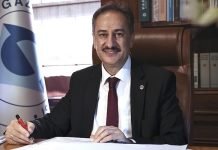Ali Ahmet Böken (46), a veteran Turkish journalist and prominent broadcaster who was sentenced in April 2018 to nine years, nine months in prison on fabricated terror charges over alleged links to the Gülen movement, was reportedly transferred from Sincan Prison in Ankara, where his family lives, to Akşehir Prison in Konya province on Monday.
According to a report by online news outlet Kronos on Tuesday, Böken was transferred to Akşehir Prison, situated about 250 kilometers from Ankara, on Monday for no ostensible reason. Kronos reported that Akşehir Prison had come to the agenda with allegations that prisoners had been tortured, their visiting relatives had been treated roughly and their right to open meetings with prisoners has been denied.
Böken is a successful journalist and broadcaster who graduated from Ankara University’s faculty of communication in 1994. He worked as a journalist, a news presenter, an editor and a news director for Samanyolu Television. He was a columnist in samanyoluhaber.com, which is related to Samanyolu Haber TV. With the establishment of Samanyolu Haber (News) TV on January 22, 2007, he became the station’s chief editor.
He left Samanyolu and went to public broadcaster TRT as a contract employee. He became the chief editor for TRT Haber, which was established on March 18, 2010. He gave lectures on public broadcasting at Zirve University as a visiting academic. He is married and has two children.

Böken was a juror for the Emmy Awards, sponsored by the International Academy of Television Arts and Sciences. Kerem Çatay, the owner of Ay Productions, was on the jury judging Best Drama Series, while Böken was on the jury for Best News at the 41st Emmy Awards.
Böken was suspended and assigned to a minor post in the strategy department after corruption investigations of December 17-25, 2013 that implicated then-Prime Minister Recep Tayyip Erdoğan, his family members and his Cabinet ministers. Following a controversial coup attempt in July 2016, he was detained on August 11, 2016.

An account at Bank Asya and the affiliation with the Gülen movement of the media companies where he used to work were presented as evidence in the case of the accomplished journalist. During the last hearing on January 23 at the Ankara 18th High Criminal Court, prosecutor Necati Kayaközü demanded 15 years’ imprisonment for Böken. The evidence presented to the court are a bank passbook, insurance documents from previous workplaces and witness statements.
There are many absurdities in the indictment, especially witness statements. For instance, the date of the crime has been shown as July 18, 2016, three days after the coup attempt. As in other indictments, the prosecutor has been claiming that the Gülen movement is a criminal organization.

FETÖ is a pejorative acronym that Turkey’s political Islamist government and autocratic Turkish President Erdoğan have been using to defame the civic Gülen movement.
Böken’s children’s going to a school that was allegedly linked to the Gülen movement and the fact that the school was closed by a government decree issued under a state of emergency declared in the aftermath of the controversial coup attempt were considered criminal offences.

The testimony of witness Tahsin Yıldız shows that sending TRT personnel abroad for education was listed among the criminal offences committed by Böken. However, as Böken stated in his defence, these policies were within the authority of the education department and board of management of TRT.
TRT’s Board of Management consists of seven members, five of whom were directly appointed by the Cabinet. The other two members are deputies elected by the general manager. Yıldız claimed that “the average cost of sending a staff member abroad is nearly a trillion Turkish lira.” Let alone the fact that this claim was not supported by any documents, it is also not logical for a staff member to spend such an enormous amount of money.

Böken denied the allegations that he used ByLock. His lawyers stated that the search, confiscation and copying of digital materials were not in compliance with the law, indicating that such materials added to the file are unlawful evidence.
Turkey is ranked 157th among 180 countries in the 2018 World Press Freedom Index released by Reporters Without Borders (RSF). If Turkey falls two more places, it will make it to the list of countries on the blacklist, which have the poorest record in press freedom.
Turkey is the biggest jailer of journalists in the world. The most recent figures documented by SCF show that 239 journalists and media workers were in jail as of July 9, 2018, most in pretrial detention. Of those in prison 178 were under arrest pending trial while only 61 journalists have been convicted and are serving their time. Detention warrants are outstanding for 143 journalists who are living in exile or remain at large in Turkey.
Detaining tens of thousands of people over alleged links to the Gülen movement, the government also closed down some 200 media outlets, including Kurdish news agencies and newspapers, after a coup attempt in Turkey on July 15, 2016.















